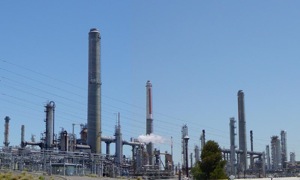Key words :
science policy,
biofuel
,renewable energy
,oil imports
,taxes
,cellulosic
,ethanol
,hydropower
The Wrong Enemy
31 Mar, 2009 09:23 am
While reading an article on oil company taxation in the Wall Street Journal, I ran across a quote from Treasury Secretary Geithner that crystallized my growing impression that the administration has misinterpreted its own mantra on energy and is training its "friend or foe" radar on the wrong enemy. I would paraphrase the Obama energy strategy as seeking to reduce US oil imports and greenhouse gas emissions by strongly promoting renewable energy and energy efficiency. Unfortunately, the administration's actions risk putting the domestic oil and gas industry on the wrong side of the divide that creates. Absent the steady output from our oil & gas producers, improved energy security--let alone energy independence--would become simply unattainable no matter how many wind turbines and solar panels we build in the next few years. Domestic oil & gas is not the enemy; it is a natural ally in the administration's quest to wean the US from our harmful over-reliance on foreign oil.
 |
Consider the latest figures from the Energy Information Agency of the Department of Energy. In 2008 "other renewables", excluding hydropower, generated 3% of the US electricity supply. Wind, solar and geothermal power--the non-hydro renewables that the President has targeted for doubling in the next three years--contributed just over half of that, or 1.6% of the total. That's up from 1.2% last year, for an impressive growth rate of 36%. If the renewable energy sector can maintain that growth for three years, helped by the stimulus package, it should easily double to 3.2% of our electricity supply. That might push the broader "other renewables" category close to 5%, and total renewables including hydropower to 10 or 11%--but all without displacing more than a tiny amount of oil, because oil (including petroleum coke) accounted for just 1.1% of net electricity generation last year, and plug-in vehicles aren't yet a measurable fraction of our vehicle fleet. Oil-burning power plants consumed 165,000 bbl/day, a paltry 0.8% of US petroleum demand. Even if the output of every new wind turbine and solar panel were devoted to backing out oil-fired power--a practical impossibility, given the geographical and time-of-use patterns involved--it wouldn't make a dent in our oil imports.
Increasing the tax burden on the oil and gas industry, by contrast, would most assuredly make a dent in our oil imports--by expanding them. Despite a recent uptick in oil prices, oil companies have seen their cash flows decline significantly in the last nine months. Under pressure to support dividends, those that can still borrow to maintain their capital investment programs are doing so; others have had to defer projects or sell off assets. Increasing their tax burden by revoking long-standing oil & gas tax breaks and singling the industry out for exclusion from a tax benefit offered to all US manufacturers, even with the logic of leveling the playing field for energy sources that emit greenhouse gases relative to those that don't, would be ill-timed, at best.
When the industry argued against higher taxes last year, some suggested that we were entitled to raise taxes on oil companies because political risk was lower in the US than elsewhere, while companies were denied access to key resources overseas. Those comparisons have shifted noticeably, as producing countries have become more receptive to foreign investment in their oil industries, thanks to the rigors of lower oil revenues. At the same time, political risk here has increased, as described in a provocative op-ed by Ian Bremmer of the Eurasia Group. The energy industry has already seen signs of this, in a proposal for an excise tax targeting companies that refuse to renegotiate the royalty relief provisions of certain Gulf of Mexico deepwater lease contracts, which were recently upheld in court. No business leader can watch the current spectacle of "outrage" and fail to wonder when he or she will sit in the hot seat.
This isn't a question of seeking sympathy for companies that have just come off a streak of record-setting profits, most of which were plowed back into the business or returned to shareholders. That would be as fruitless as soliciting aid for AIG's financial products employees. Rather, we need to look to our self-interest, here. When an oil company drills in the US, its production backs out imports directly, barrel for barrel. It pays US salaries--attractive ones--and it pays hefty taxes: income taxes at a 40% effective rate, along with billions of dollars in royalties, rents and bonus bids collected by the government. When a US oil company drills elsewhere, much of the benefit is captured by foreign governments, and when the oil we import comes from a non-US supplier, our trade deficit swells and the federal government only gets to tax the profits on refining & marketing, which are often pretty thin.
In the future, when we've cracked the code for producing liquid fuels cheaply from abundant non-food biomass, covered our hills and shorelines with wind farms and our deserts and roofs with solar arrays, and have sufficient domestic energy supplies--used efficiently--to back out the last of our oil imports, then the time will be ripe to talk about winding down the domestic oil industry, along with the emissions from the remaining petroleum products. Until then, rather than penalizing them on the basis of fractured logic suggesting this will somehow reduce our oil consumption, it is very much in the public interest for the government to treat the domestic oil industry as a partner, not a foe, and refrain from making it less attractive to drill in the US.
Read the article on oil company taxation in the Wallstreet Journal
Originally published on Energy Outlook
Key words :
science policy,
biofuel
,renewable energy
,oil imports
,taxes
,cellulosic
,ethanol
,hydropower
2 comment(s)
[1]
Comment by Alice Finkel
15 Apr, 2009 05:05 am
The Obama administration's top priority is not to spark a healthy new energy economy. It is to make America into a huge slumlands, and for themselves to be its slumlords. With that in mind, it makes perfect sense for them to drive domestic oil and gas companies into destitution along with the rest of the economy.
 Alert Moderator
Alert Moderator
[2]
Comment by Geoff Styles
15 Apr, 2009 09:11 pm
As much as that outcome (re oil, not the whole economy) might please some of the administration's supporters, I don't see a deliberate attempt to beggar the oil industry, merely a failure to regard it as anything more than a source of useful tax revenue and unwanted emissions. Supplying over a third of the country's energy needs from domestic resources can't compete with the allure of renewables.
 Alert Moderator
Alert Moderator







 Read more
Read more